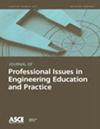土木工程与建筑管理课程项目规划的综合体验式学习框架
Q1 Business, Management and Accounting
Journal of Professional Issues in Engineering Education and Practice
Pub Date : 2019-10-01
DOI:10.1061/(ASCE)EI.1943-5541.0000421
引用次数: 18
摘要
在项目早期阶段利用建筑信息模型(BIM)技术的能力对于推动其在整个项目生命周期中的有效性至关重要。然而,对文献的回顾表明,缺乏对土木工程和建筑管理(CECM)专业本科生技能提升的研究,特别是在设计、规划、处理、管理和沟通复杂项目中使用BIM等能力方面。为了更好地促进本科学生的技能,本研究利用Kolb的体验式学习(EL)制定了一个创新框架,并为项目规划和实施量身定制了BIM顶点课程活动。这个框架包括具体的经验、反思的观察、抽象的概念化和积极的实验。它提供了EL、BIM规划指南和顶点课程教学法的必要整合。它帮助教师根据BIM规划指南监测和控制学习活动,并通过实验测试假设。该框架包括小组工作参与、与实践信息的联系以及以学生为中心的学习。随后对学生和教师的调查进一步证明了该框架的优点,特别是在促进了学生对基于bim的项目规划的认知形成(提高了90%),以及在流程映射(提高了70%)、软件操作(提高了80%)和信息交换(提高了100%)方面的能力。提出的框架设置了一个创新的教学理论基础,以大学为基础的BIM教育可以参考和提高大学生的技能,在EL背景下扩展他们在信息和通信技术方面的能力。本文章由计算机程序翻译,如有差异,请以英文原文为准。
Integrated Experiential Learning–Based Framework to Facilitate Project Planning in Civil Engineering and Construction Management Courses
The competence of leveraging Building Information Modeling (BIM) technology in the early project stages is critical to drive its efficacy throughout the project life cycle. However, a review of the literature indicated a lack of research into upskilling undergraduate students in civil engineering and construction management (CECM) majors, particularly with respect to such competencies as using BIM in design, planning, processing, managing, and communicating complex projects. To better facilitate the skills for undergraduate students, this study formulated an innovative framework using Kolb’s experiential learning (EL) with tailored BIM capstone course activities for project planning and implementations. This framework includes concrete experience, reflective observation, abstract conceptualization, and active experimentation. It provides the necessary integration of EL, the BIM planning guide, and pedagogies of capstone courses. It helps instructors to monitor and control learning activities based on the BIM planning guide and to test hypotheses through experiments. The framework includes features of group work involvement, connection with practical information, and student-centered learning. Subsequent surveys of students and teachers provided further evidence of the framework merits, specifically in terms of the improved formation of student cognition of BIM-based project planning (90% improvement), in addition to enhanced capabilities in process mapping (70% improvement), software operation (80% improvement), and information exchange (100% improvement). The proposed framework sets an innovative pedagogical rationale to which university-based BIM education can refer and upskills undergraduate students, expanding their capabilities in information and communication technology in the context of EL.
求助全文
通过发布文献求助,成功后即可免费获取论文全文。
去求助
来源期刊
CiteScore
3.10
自引率
0.00%
发文量
0
审稿时长
>12 weeks
期刊介绍:
The Journal of Professional Issues in Engineering Education and Practice presents issues of broad professional interest and diverse views of engineering education, and professional practice. Papers examine the relationships between civil engineering and other disciplines and professions, with emphasis on the engineer"s and constructor"s obligations and responsibilities. Topics include engineering education at all levels, professional practice issues, ethics, and history and heritage.

 求助内容:
求助内容: 应助结果提醒方式:
应助结果提醒方式:


